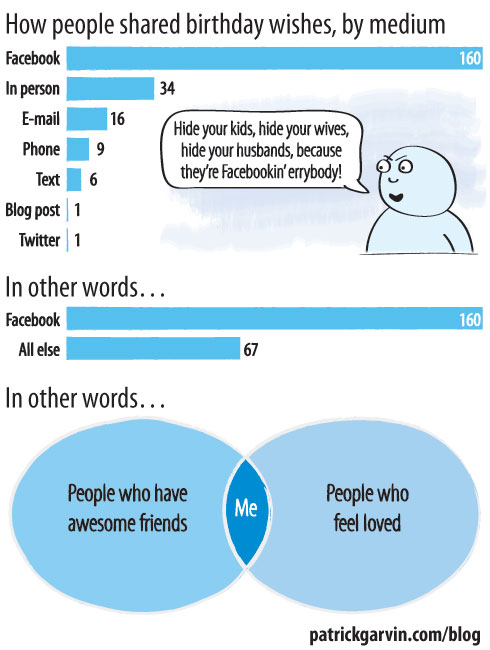Social Media Guide posted an interesting link this morning: “34 Reasons To Start A Blog.” It’s a pretty good list, and many of those reasons factored in my decision to start this very blog.
When I created my online portfolio, I asked an SEO-minded friend how to get page views for my site. (“SEO,” for the n00bs and unititiated, being “search engine optimization”). I could pay Google oodles to be one of the sponsored results at the top of the page, but that would not be fun, he warned.
“The owners of those sites paid Google directly for you to see those listings. They maybe didn’t pay too much to get that link high on the page, but if you click on that link, Google may […] them over for more than a dollar just for that click. And if you don’t buy anything on their site or click on one of their sponsor ads or something, you and Google make them look and feel like real assholes… Based on the type of website this is, the types of visitors you’re trying to attract and my assumption that you don’t want to pay through the ass to get your numbers to creep up, free SEO tactics are probably what you’re most interested in.”
And? Those free SEO tactics?
- Start a blog. “It doesn’t have to be a strictly graphics blog, but it should mostly be about you and your career and design and whathaveyou. Also things that you think are interesting and cool. You want to do this because search engines reward sites that are updated more frequently, so just a couple short blog posts per week will help. A post could be just a heading, a couple sentences, a link and a picture, and that will go toward boosting SEO. Putting links in blog posts, and really anywhere else on your site, will also help. Search engines like sites with lots of external links.”
- Get people to link their site to yours. “It’s up to you how you want to arrange for this to happen and whose sites you’d like to have linked back to yours. Search engines also like sites that have lots of links going TO them, so this gives everyone an incentive to ‘link swap,’ or agree to link to one another’s site in an even exchange.”
- Optimize your copy. “The basic principle is super straightforward: if you have a specific phrase that appears prominently and multiple times in the copy on a page of your site, your site is more likely to come up in the search results for that specific phrase. For instance, ‘info graphics artist,’ ‘info graphics designer,’ ‘Jacksonville illustrator’ and ‘news graphic design’ may all be appropriate for your list. More generic phrases like ‘info graphics artist’ will put you up against more competition, and while they may improve your ranking for those phrases, they may never get you close to the top of the list. As you get more specific, ‘Jacksonville illustrator,’ for example, you’ll be up against fewer sites and can make it closer to the top of the list. If you need help coming up with search term ideas based on your basic keywords, use the free Google Adwords Keyword Suggestion Tool.”
- Work those phrases into copy on your site in a way that comes across as natural. “It matters where they appear; search engines can tell heading text apart from body text, and they weigh it more heavily. All text that is emphasized in terms of font size and placement on the page is weighted to some degree. For each given page, I would recommend choosing just one or two selected search terms. Try to find a way to work one or both phrases into the title bar at the top of the browser window, and pick one phrase to put in the heading over the body text on that page. Then use one or both phrases about two times each per 300 words of body text, as a general rule of thumb. Be sure to list both terms in the meta tags and site description. Capitalization and punctuation won’t affect the phrases in terms of their effectiveness in optimization, but any other editing will, like inserting additional words within a phrase, changing spelling, etc.”
Another friend who’s much more web savvy than me offers this morsel for journalists wanting to blog:
“It’s one thing to have a nicely designed portfolio site that features your work, but a competitive job a recruiter also wants to see that you are involved in the cutting edge issues of your industry and demonstrating that you have ideas, and that other people care what you think and are commenting on it. In other words, I don’t just want to see your clips. I want to see you thinking critically about other people’s work and leading a conversation with other key players in your industry.”
From that Social Media Guide link, I found another blog-related read: Why Start a Blog and 25 Tips to Make it Work.
Enjoy, and get to blogging.

